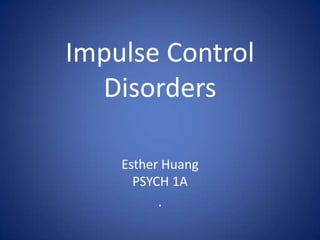
Impulse Control Disorder
- 1. Impulse Control Disorders Esther HuangPSYCH 1A .
- 2. Impulse Control Disorder is characterized by… inability to stop performing harmful acts that is destructive to oneself and others, a drug free addiction The individual has no control over taming their impulses Anxiety is released when the harmful action is done
- 3. Why do people continue to hurt themselves even though they know it is bad for them? People with impulse control disorders tend to seek small and temporary pleasure at the expense of a long term loss.
- 4. Causes of Impulsive Control Disorders Not fully known how it starts Serious head injuries and those with epilepsy have a higher risk of developing this Suggested as a side effect of other medical conditions Abnormal neurological development and brain chemistry
- 5. Several types of Impulse Control Disorders Trichotillomania – pulling out hair uncontrollably, leading to hair loss Pathological gambling – excessive gambling even when losing tons of money
- 6. Intermittent explosive disorder – periodic violent and hostile outbursts that harms people or property Pyromania The impulse to set fires for no reason
- 7. Treatment Varies depending on specific ICD Cognitive-behavioral Therapy Selective serotonin reuptake inhibitors (SSRIs) and medication individual psychotherapy Stress management
- 8. Case Study Carol, a 16 year old, could not control pulling her hair, including her scalp, eyebrows and eyelashes Felt an itch in her hair and proceeded to pull it to get relief While doing homework, watching T.V, and reading, Carol would unconsciously play and pull her eyebrows/eyelashes
- 9. Cognitive Behavorial Treatment Strategies Avoid being alone at home, since enviroment cues can trigger it Used gloves initially, then settled on a bracelet that would make noise so that Carol will notice she was pulling her hair Replacing behavior by playing with a brush where small bristles were present Cognitive approach: Change her thinking Since her reason to pull was that she felt an itch, numbing cream was used on her eyebrows
- 10. Results Achieved moderate success with cognitive behavioral treatment in weeks 3-4 Used to pull hair 10-15 times a night, and now does it only 5-6 times In weeks 5-9, Carol used numbing topical cream (could only apply to eyebrows). She stopped pulling her eyebrows, and was pleased, but still continued to pull her eyelashes 2-3 times a month Four month followup – Carol did not continue to pull her eyebrows anymore, but still was pulling her eyelashes
- 11. Scientific Study A study conducted by Marc N. Potenza, MD, PhD, of Yale University and colleagues showed that pathological gamblers have decreased activeness in brain areas Two groups were used: Pathological gamblers (10) and participants without PG (11) They used functional magnetic resonance imaging on participants while they viewed videos of happy, sad and gambling occasions
- 12. Men with PG reported stronger urges to gambling after watching the gambling video Both groups did not differ much on terms on the happy and sad videos Those with PG had a decreased activity level in regions of brains thought to be involved in impulse control when the gambling video was shown
- 13. Bibliography David A. Dia. Health and Social Work. May 2008 v33 i2 p155(4). "I can't stop pulling my hair!" using numbing cream as an adjunct treatment for trichotillomania Case study Dopaminergics appear to impair impulse control. Patrice Wendling. Internal Medicine News. Sept 1, 2008 v41 i17 p27(1). Pathological gamblers' brains respond differently to depictions of gambling. Biotech Week. August 27, 2003 p583. Full Text: COPYRIGHT 2003 NewsRX https://health.google.com/health/ref/Trichotillomania http://www.psychologyinfo.com/problems/impulse_control.html#pyro http://www.forensicpsychiatry.ca/impulse/overview.htm Images from Google